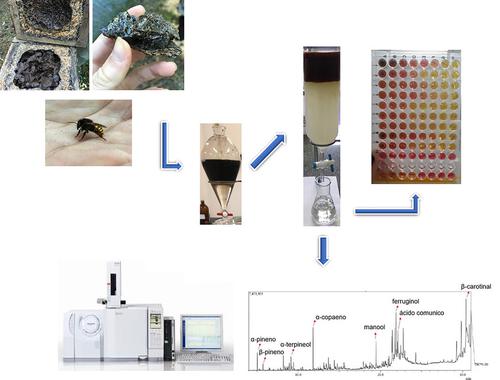当前位置:
X-MOL 学术
›
Chem. Biodivers.
›
论文详情
Our official English website, www.x-mol.net, welcomes your
feedback! (Note: you will need to create a separate account there.)
Mollicute Anti‐adhesive and G rowth Inhibition Properties of the Methanolic Extract of Propolis from the Brazilian Native Bee Melipona quadrifasciata
Chemistry & Biodiversity ( IF 2.3 ) Pub Date : 2020-12-07 , DOI: 10.1002/cbdv.202000711 Caroline Galgowski 1 , Sara Pavanelo Frare 2 , Martinho Rau 1, 3 , Michele Debiase Alberton 1, 4 , Sérgio Althoff 5 , Alessandro Guedes 4 , Caio Mauricio Mendes de Cordova 1, 4
Chemistry & Biodiversity ( IF 2.3 ) Pub Date : 2020-12-07 , DOI: 10.1002/cbdv.202000711 Caroline Galgowski 1 , Sara Pavanelo Frare 2 , Martinho Rau 1, 3 , Michele Debiase Alberton 1, 4 , Sérgio Althoff 5 , Alessandro Guedes 4 , Caio Mauricio Mendes de Cordova 1, 4
Affiliation

|
Hydroalcoholic propolis extracts from the bee species Melipona quadrifasciata have been shown to possess antimicrobial activity against different mollicute strains, but a methanolic extract (ME) could contain an increased diversity of nonpolar bioactive components with a potentially higher antimicrobial activity. The ME obtained by maceration of the propolis sample was fractionated with solvents of different polarities and then, purified by silica gel column chromatography through biomonitoring of its antimicrobial activity against mollicute strains. Analysis by gas chromatography‐mass spectrometry (GC/MS) enabled the identification of compounds using the NIST library. Minimum inhibitory concentrations (MICs) of the samples were determined by broth microdilution. Anti‐adhesive assays were performed with Mycoplasma pneumoniae cells. The hexane (MIC=62.5 mg/L) and dichloromethane (MIC=125 mg/L) fractions presented the most promising results against M. pneumoniae. They were fractionated into 74 subfractions, and even the best ones did not show better results (MIC>250 mg/L) than their original fractions, likely due to the loss of terpene compounds that seem to act in synergy. The dichloromethane subfraction FD4 was highlighted in the anti‐adhesive assay with an inhibitory activity of 21.6 %. A synergistic effect of the nonpolar compounds in M. quadrifasciata propolis may be responsible for its antibacterial activity, but several purified components can improve its anti‐adhesive properties.
中文翻译:

巴西本土蜜蜂 Melipona quadrifasciata 蜂胶甲醇提取物的抗粘连和生长抑制特性
来自蜜蜂物种 Melipona quadrifasciata 的水醇蜂胶提取物已被证明对不同的 mollicute 菌株具有抗菌活性,但甲醇提取物 (ME) 可能含有更多多样性的非极性生物活性成分,具有潜在更高的抗菌活性。通过浸渍蜂胶样品获得的 ME 用不同极性的溶剂进行分离,然后通过硅胶柱色谱法通过生物监测其对 mollicute 菌株的抗菌活性进行纯化。气相色谱-质谱联用 (GC/MS) 分析能够使用 NIST 库鉴定化合物。样品的最低抑菌浓度 (MIC) 由肉汤微量稀释确定。用肺炎支原体细胞进行抗粘附试验。己烷 (MIC=62.5 mg/L) 和二氯甲烷 (MIC=125 mg/L) 馏分对肺炎支原体产生了最有希望的结果。它们被分成 74 个子级分,即使是最好的子级分也没有显示出比原始级分更好的结果(MIC>250 mg/L),这可能是由于失去了似乎协同作用的萜类化合物。二氯甲烷亚级分 FD4 在抗粘连试验中突出显示,抑制活性为 21.6%。M. quadrifasciata 蜂胶中非极性化合物的协同作用可能是其抗菌活性的原因,但几种纯化的成分可以提高其抗粘附性能。即使是最好的那些也没有显示出比它们原始级分更好的结果(MIC>250 mg/L),这可能是由于似乎协同作用的萜类化合物的损失。二氯甲烷亚级分 FD4 在抗粘连试验中突出显示,抑制活性为 21.6%。M. quadrifasciata 蜂胶中非极性化合物的协同作用可能是其抗菌活性的原因,但几种纯化的成分可以提高其抗粘附性能。即使是最好的那些也没有显示出比它们原始级分更好的结果(MIC>250 mg/L),这可能是由于似乎协同作用的萜类化合物的损失。二氯甲烷亚级分 FD4 在抗粘连试验中突出显示,抑制活性为 21.6%。M. quadrifasciata 蜂胶中非极性化合物的协同作用可能是其抗菌活性的原因,但几种纯化的成分可以提高其抗粘附性能。
更新日期:2020-12-07
中文翻译:

巴西本土蜜蜂 Melipona quadrifasciata 蜂胶甲醇提取物的抗粘连和生长抑制特性
来自蜜蜂物种 Melipona quadrifasciata 的水醇蜂胶提取物已被证明对不同的 mollicute 菌株具有抗菌活性,但甲醇提取物 (ME) 可能含有更多多样性的非极性生物活性成分,具有潜在更高的抗菌活性。通过浸渍蜂胶样品获得的 ME 用不同极性的溶剂进行分离,然后通过硅胶柱色谱法通过生物监测其对 mollicute 菌株的抗菌活性进行纯化。气相色谱-质谱联用 (GC/MS) 分析能够使用 NIST 库鉴定化合物。样品的最低抑菌浓度 (MIC) 由肉汤微量稀释确定。用肺炎支原体细胞进行抗粘附试验。己烷 (MIC=62.5 mg/L) 和二氯甲烷 (MIC=125 mg/L) 馏分对肺炎支原体产生了最有希望的结果。它们被分成 74 个子级分,即使是最好的子级分也没有显示出比原始级分更好的结果(MIC>250 mg/L),这可能是由于失去了似乎协同作用的萜类化合物。二氯甲烷亚级分 FD4 在抗粘连试验中突出显示,抑制活性为 21.6%。M. quadrifasciata 蜂胶中非极性化合物的协同作用可能是其抗菌活性的原因,但几种纯化的成分可以提高其抗粘附性能。即使是最好的那些也没有显示出比它们原始级分更好的结果(MIC>250 mg/L),这可能是由于似乎协同作用的萜类化合物的损失。二氯甲烷亚级分 FD4 在抗粘连试验中突出显示,抑制活性为 21.6%。M. quadrifasciata 蜂胶中非极性化合物的协同作用可能是其抗菌活性的原因,但几种纯化的成分可以提高其抗粘附性能。即使是最好的那些也没有显示出比它们原始级分更好的结果(MIC>250 mg/L),这可能是由于似乎协同作用的萜类化合物的损失。二氯甲烷亚级分 FD4 在抗粘连试验中突出显示,抑制活性为 21.6%。M. quadrifasciata 蜂胶中非极性化合物的协同作用可能是其抗菌活性的原因,但几种纯化的成分可以提高其抗粘附性能。











































 京公网安备 11010802027423号
京公网安备 11010802027423号